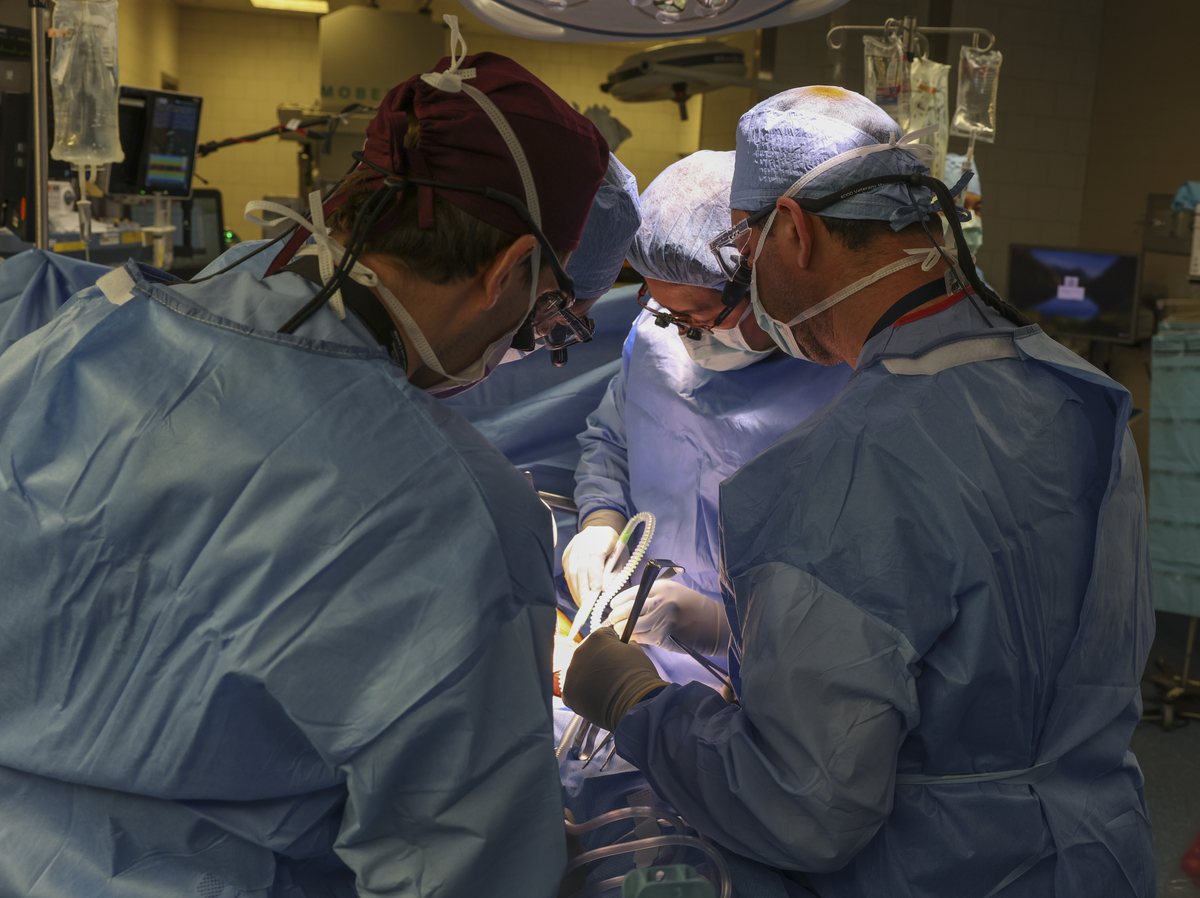
Surgeons carry out the primary transplant of a genetically modified pig kidney right into a residing human at Massachusetts Normal Hospital in Boston.
Michelle Rose/Massachusetts Normal Hospital
cover caption
toggle caption
Michelle Rose/Massachusetts Normal Hospital

Surgeons carry out the primary transplant of a genetically modified pig kidney right into a residing human at Massachusetts Normal Hospital in Boston.
Michelle Rose/Massachusetts Normal Hospital
For the primary time, surgeons have transplanted a kidney from a genetically modified pig right into a residing individual, medical doctors in Boston mentioned Thursday.
Richard Slayman, 62, of Weymouth, Mass., who’s affected by end-stage kidney illness, acquired the organ Saturday in a four-hour process, Massachusetts Normal Hospital introduced. He’s recovering properly and is predicted to be discharged Saturday, the hospital mentioned.
“I noticed it not solely as a approach to assist me, however a approach to supply hope for the hundreds of people that want a transplant to outlive,” Slayman mentioned in an announcement launched by the hospital.
The process is the most recent growth in a fast-moving race to create genetically modified pigs to supply kidneys, livers, hearts and different organs to assist alleviate the scarcity of organs for individuals who want transplants.
“Our hope is that this transplant method will supply a lifeline to thousands and thousands of sufferers worldwide who’re affected by kidney failure,” mentioned Dr. Tatsuo Kawai, the hospital’s director for medical transplant tolerance, within the hospital assertion.
Animal organs may ease transplant scarcity
A number of biotech firms are racing to develop a provide of cloned pigs whose DNA has been genetically modified so they will not be rejected by the human physique, unfold pig viruses to individuals or trigger different problems. NPR lately received unique entry to a analysis farm breeding these animals for an organization on this competitors, Revivicor Inc. of Blacksburg, Va.
The kidney transplanted in Boston got here from a pig created by eGenesis of Cambridge, Mass. The eGenesis pigs are bred with 69 genetic modifications to organize organs for human transplantation. The modifications shield in opposition to a virus recognized to contaminate pigs in addition to delete pig genes and add human genes to make the organs appropriate with individuals.
“We’re grateful for the brave contribution of the affected person and to the development of transplantation science,” mentioned Mike Curtis, chief government officer for eGenesis within the assertion. “This represents a brand new frontier in medication and demonstrates the potential of genome engineering to alter the stay of thousands and thousands of sufferers.”
The sphere is stirring pleasure about harnessing cloning and gene-editing applied sciences to resolve the persistent scarcity of organs for human transplantation. Greater than 103,000 persons are at the moment on the ready listing for organs. About 17 die daily as a result of they can not get one.
Finish-stage renal illness is 3.8 instances extra widespread amongst Black individuals than white individuals within the U.S., in line with federal statistics.
The transplant “represents a possible breakthrough in fixing one of many extra intractable issues in our subject, that being unequal entry for ethnic minority sufferers to the chance for kidney transplants as a result of excessive donor organ scarcity and different system-based limitations,” mentioned Dr. Winfred Williams, the kidney specialist treating Slayman, who’s a Black man.
Reservations about utilizing animal organs in individuals
However the analysis can also be elevating a number of considerations. One fear is about the opportunity of spreading animal viruses to people. One other is about slaughtering hundreds of animals yearly to reap their organs.
“I feel we have to be very, very cautious,” L. Syd M. Johnson, a bioethicist at SUNY Upstate Medical College in Syracuse, N.Y., informed NPR. “I’ve a whole lot of considerations a couple of remedy that may be very a lot unproven.”
Some additionally query testing these organs on gravely ailing sufferers.
“If the FDA needs to discover the usage of pig kidneys in people, it might be higher to authorize a part I medical trial so we will start to collect extra systematic proof about this,” Michael Gusmano, a bioethicist at Lehigh College, wrote NPR in an e mail.
Surgeons have already transplanted kidneys and livers from genetically modified cloned pigs into baboons and a handful of mind lifeless individuals. Surgeons on the College of Maryland even examined hearts in two males who had run out of different choices. They lived for a number of weeks after the procedures.
Slayman received a human kidney transplant after being on dialysis for seven years, in line with the hospital. However his transplanted kidney confirmed indicators of failure after about 5 years, forcing Slayman to renew dialysis final Might. He is since been struggling severe problems.
The transplant of the pig kidney was made doable by the Meals and Drug Administration as a part of a “compassionate use” program aimed toward serving to determined sufferers.
“When my transplanted kidney started failing in 2023, I once more trusted my care workforce at MGH to satisfy my targets of not simply bettering my high quality of life however extending it,” Slayman mentioned within the hospital’s assertion, including the medical doctors defined the “execs and cons of this process.”


